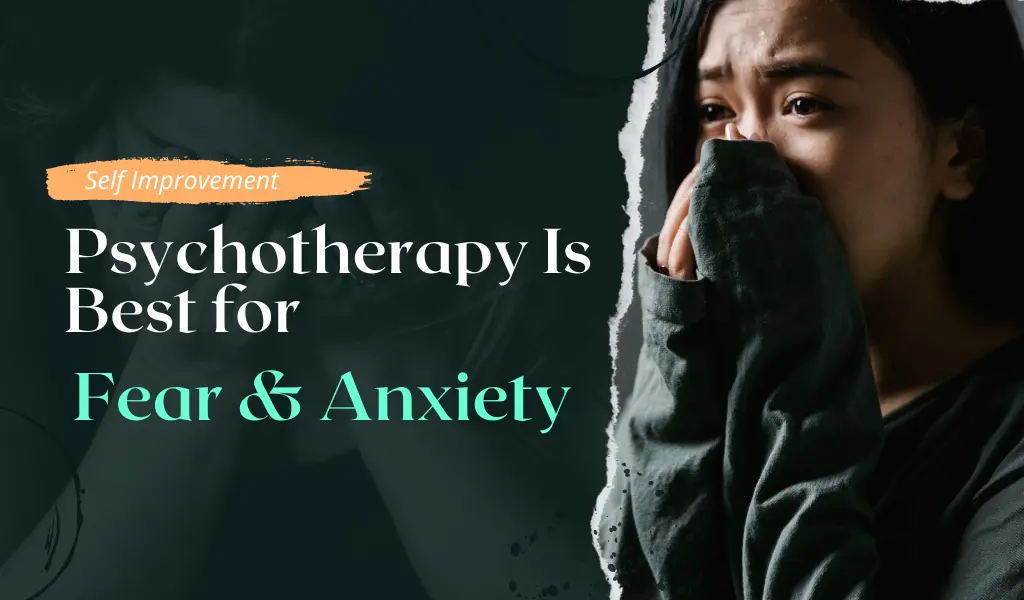Anxiety affects millions of people in the USA. It’s a common mental health condition that can feel overwhelming, but effective treatments exist. Psychotherapy is one of the most reliable ways to manage anxiety, offering long-term relief without medication in many cases.
But with several therapy options available, how do you know which one is best for you? Let’s dive into the most effective psychotherapies for anxiety and how they work.
You May Also Like: Get Your Vitamin P: Why Pleasure Matters in Eating
Why Psychotherapy for Anxiety?
Psychotherapy helps address the root causes of anxiety. Unlike medication, which primarily manages symptoms, therapy offers tools and strategies for coping with triggers.
Benefits of psychotherapy for anxiety include:
- Identifying and challenging negative thought patterns.
- Learning relaxation techniques.
- Building resilience and emotional regulation.
- Addressing past traumas contributing to anxiety.
Psychotherapy is a highly personalized process. The best approach depends on your specific needs and type of anxiety disorder.
1. Cognitive Behavioral Therapy (CBT)
What It Is
CBT is the gold standard for anxiety treatment. It focuses on identifying and changing unhelpful thought patterns that fuel anxiety.
How It Works
CBT helps you recognize distorted thinking, such as catastrophizing or black-and-white thinking. Therapists guide you in replacing these thoughts with realistic, balanced ones.
Why It’s Effective
- Proven success for generalized anxiety disorder (GAD), panic disorder, and social anxiety.
- Teaches practical skills you can use daily.
- Short-term and structured, often lasting 12-20 sessions.
2. Exposure Therapy
What It Is
Exposure therapy is a technique that gradually exposes you to feared situations or objects in a safe, controlled environment.
How It Works
You work with a therapist to confront your fears step by step. This reduces the fear response over time, a process called habituation.
Why It’s Effective
- Particularly useful for phobias, OCD, and PTSD.
- Builds confidence in handling anxiety-provoking scenarios.
- Can be combined with CBT for even greater effectiveness.
3. Mindfulness-Based Stress Reduction (MBSR)
What It Is
MBSR is a therapeutic approach that uses mindfulness practices to reduce anxiety. It teaches you to stay present and observe your thoughts without judgment.
How It Works
You’ll learn techniques like meditation, breathing exercises, and body scans. These practices calm your nervous system and reduce anxiety symptoms.
Why It’s Effective
- Great for managing GAD and stress-related anxiety.
- Encourages self-awareness and emotional balance.
- Non-invasive and adaptable to daily life.
4. Acceptance and Commitment Therapy (ACT)
What It Is
ACT focuses on accepting anxious feelings rather than fighting them. It encourages living a meaningful life despite discomfort.
How It Works
Therapists help you identify your core values and commit to actions aligned with them. Anxiety is treated as a natural part of life, not a barrier.
Why It’s Effective
- Helps with chronic anxiety and emotional avoidance.
- Promotes resilience and personal growth.
- Often combined with mindfulness techniques.
5. Psychodynamic Therapy
What It Is
Psychodynamic therapy explores unconscious thoughts and past experiences contributing to anxiety.
How It Works
This approach delves into childhood experiences and unresolved conflicts to uncover the root causes of anxiety.
Why It’s Effective
- Addresses deep-seated emotional issues.
- Useful for anxiety linked to trauma or relationship patterns.
- Longer-term therapy for lasting results.
6. Eye Movement Desensitization and Reprocessing (EMDR)
What It Is
EMDR is a specialized therapy for anxiety stemming from trauma or PTSD. It uses guided eye movements to process distressing memories.
How It Works
While recalling traumatic events, you follow the therapist’s guided movements. This reduces the emotional intensity of the memory.
Why It’s Effective
- Highly effective for trauma-related anxiety.
- Shortens the time needed to process traumatic experiences.
- Builds confidence and emotional stability.
7. Interpersonal Therapy (IPT)
What It Is
IPT focuses on improving relationships and social interactions to reduce anxiety.
How It Works
You and your therapist explore how interpersonal challenges affect your mental health. Skills like communication and boundary-setting are emphasized.
Why It’s Effective
- Ideal for social anxiety and anxiety linked to relationships.
- Strengthens emotional support networks.
- Often time-limited and focused.
Choosing the Right Therapy for You
The type of therapy that works best depends on:
- The specific anxiety disorder (e.g., GAD, social anxiety, PTSD).
- Your personal preferences and comfort level.
- Whether you have co-existing conditions like depression.
Tips for Finding the Right Therapist
- Look for therapists who specialize in anxiety.
- Ask about their approach and preferred therapy styles.
- Ensure a good fit in terms of communication and comfort.
Can Therapy Be Combined with Other Treatments?
Many people combine psychotherapy with:
- Medication: Such as antidepressants or anti-anxiety drugs.
- Lifestyle Changes: Exercise, healthy eating, and regular sleep.
- Support Groups: Sharing experiences with others who understand.
This integrated approach often leads to the best outcomes.
The Benefits of Psychotherapy for Anxiety
Therapy doesn’t just reduce anxiety symptoms – it empowers you. Here’s what you gain:
- Improved emotional regulation.
- Tools to handle future challenges.
- Increased self-awareness and confidence.
Psychotherapy fosters lasting change. It helps you break free from the grip of anxiety and live a more fulfilling life.
Conclusion
Anxiety can feel overwhelming, but the right psychotherapy offers hope. From CBT to mindfulness-based therapies, there’s a treatment for everyone.
Take the first step by reaching out to a qualified therapist. With time, effort, and the right approach, you can manage your anxiety and embrace a calmer, more balanced life.











[…] You May Also Like: What Type of Psychotherapy Is Best for Anxiety? […]